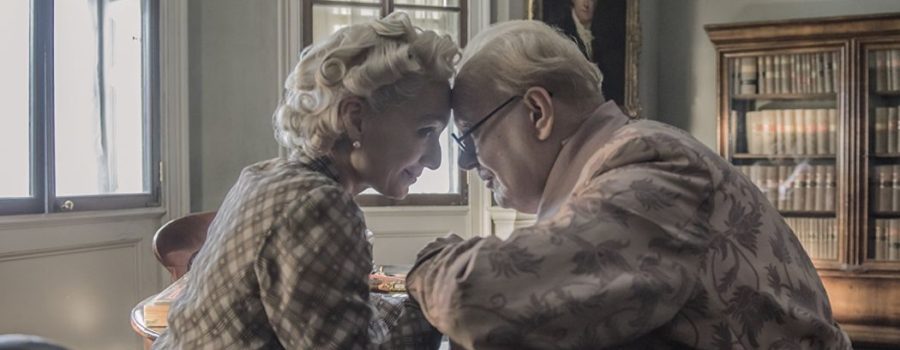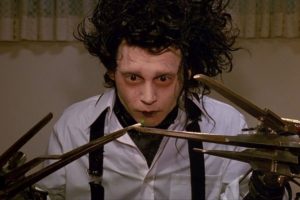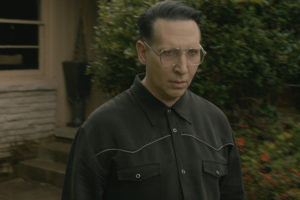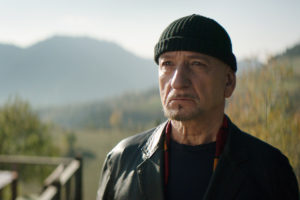[Published at Film Inquiry] With Pride & Prejudice, Atonement, Anna Karenina, and now Darkest Hour, director Joe Wright has established himself as a master of period pieces. Darkest Hourmarks Wright’s first historical period piece and, with Gary Oldman as Winston Churchill, he’s directed his greatest performance yet. The film follows the first sixteen days (May 10, 1940 – May 26, 1940) of Churchill in office serving his first term as Prime Minister of the United Kingdom.
From the skepticism and opposition from the Conservative party as well as King George VI, or “Bertie” (Ben Mendelsohn) and, eventually, the Labour party, to the imminent threat of Hitler’s army invading France and Belgium and pushing toward the United Kingdom, to the Battle of Dunkirk, Darkest Hour covers a lot of ground in its 125-minute runtime. Fittingly, as a wartime Prime Minister, Churchill had to do just that, scramble to earn the respect of the people of Great Britain and his peers while attempting to win a war.
Surprisingly, screenwriter Anthony McCarten (The Theory Of Everything) manages to effortlessly cover Churchill’s complex relationships with his wife, Clementine (Kristin Scott Thomas), allies (Sir Anthony Eden, played by Samuel West), and close personal assistant, Elizabeth Nel née Layton (Lily James). Through Churchill, the public leader, and Churchill, the private citizen, McCarten and Wright show the most wholly-embodied depiction of Winston Churchill displayed onscreen yet. With impeccable direction, engaging dialogue, consummate costume and makeup, and one of the best performances ever to grace the silver screen by Oldman, Darkest Hour is an overwhelming achievement.
Bending The Facts For Dramatic Flair
Darkest Hour is entertaining from beginning to end. However, McCarten and Wrightembellish and change a few things slightly to add more drama and amusement. Viscount Halifax and former Prime Minister Neville Chamberlain didn’t oppose Churchill’s rule as vocally and viciously as shown in the film, and Sir Anthony Eden, Churchill’s Secretary of State for War, portrayed as overtly loyal in Darkest Hour, actually suggested capitulation to the Germans silently along with the rest of the War Cabinet when Churchill was zealously opposed to it.
Given the story’s sixteen-day time span, Elizabeth Layton had to be written into history one year earlier than when she actually started working as Churchill’s secretary to depict an important relationship. In Darkest Hour, there is a touching scene in which she explains to Churchill that her brother was one of the soldiers fighting in Dunkirk. Though this is a great moment to display Churchill’s empathy and Oldman’s far-reaching range of emotions, it is fiction. It is, however, one of the moments that prompts Churchill to aggressively pursue the Dunkirk rescue mission, Operation Dynamo, an important plot point in Darkest Hour.
There is a wonderful, emotional scene during which Churchill rides the subway for the first time in his life to Westminster. On the Underground, he asks several UK citizens of all walks of life, men, women, and children, if they would accept peace negotiations with Hitler, all of which vehemently oppose, prompting Churchill to ultimately stop considering capitulation (in reality, it is widely regarded by historians that Churchill never considered surrendering to Hitler as Darkest Hour depicted) and carry on with his original policy of “wage war at all costs.” However, this is also another great moment to display Oldman’s range as an actor.

Churchill’s speech with the ministers of Cabinet rank who were not part of the War Cabinet, whom he had not yet met with since his appointment of Prime Minister, during which he shouted, “if this long island story of ours is to end at last, let it end only when each one of us lies choking in his own blood upon the ground,” was not met with widespread cheer, but rather, faint approval.
McCarten and Wright made the reception more lively for dramatic effect. Moreover, the decision by the people and the government to not surrender was not as instantaneous as portrayed in Darkest Hour, though the onscreen representation of jubilation in reaction to Churchill’s rhetoric is thoroughly rousing nonetheless and makes for a great cinematic moment.
Winston Churchill, The Leader And The Man
The first scene of Churchill is between him and Layton in his home. It is Layton’s first day on the job, and, in Churchill’s old age, he’s become seemingly callous, rude, and sarcastic. A writer by craft, Churchill painstakingly dictates a speech to Indian Army 1st Baron, General Hastings Lionel Ismay, who would become his chief military assistant and staff officer during the war.
After slurring his words (Darkest Hour also takes some liberties in Churchill’s portrayal as a “drunkard;” he was a functional alcoholic) he repeatedly blames it on Layton, all while laying in bed in his pajamas. This scene is an apt introduction to Churchill’s personality; he was incredibly emotional and could turn from shouting in rage to cracking witty jokes in an instant. It also immediately establishes James‘ portrayal as an onscreen equal to Oldman’s performance.
At home, Churchill was rather tender with his wife, for the most part throughout Darkest Hour. Having been together for nearly 35 years, they’d become accustomed to each other’s tendencies. In particular, Clementine had to adjust her lifestyle for Winston, and Scott Thomas portrays the difficulties of having to live with such a stubborn and, at times, brutish man with nuance and incredible restraint. Scott Thomas is always brewing underneath the surface, seemingly about to come apart at the seems, but she holds it together.
Clementine stressed the most over their finances, as, with Churchill’s writer’s and politician’s wages, their income wasn’t as high as the average aristocrat. In fact, they struggled greatly, financially. As difficult as Churchill may have been to put up with, Clementine loved him loyally. At first, Churchill is indifferent and coarse with his secretary, Layton, in Darkest Hour, but as they work more closely together throughout the film, they develop a heartfelt relationship that shows Churchill’s more sensitive and feminine side. James‘ and Oldman’s chemistry and character growth together is one of the many strengths of Darkest Hour.

Churchill was appointed as a result of Chamberlain’s incompetency. Most of the Conservative party wanted Halifax to take office, but Churchill was the only person who had the approval of the Labour party at the time. In Darkest Hour, Churchill is constantly criticized by his fellow party members and King Bertie alike, who was a close friend of Halifax. They all address his previous shortcomings:
Firstly, his poor judgment, as displayed during the Gallipoli Campaign in WWI, which they almost take pleasure in discussing and reminding him of throughout Darkest Hour. As First Lord of the Admiralty, he made a poor military judgment call that ended in bloodshed by the Turks, leaving 56,707 Allied troops dead.
Churchill is also criticized for supporting King Bertie’s brother, King Edward’s abdication and controversial marriage to American socialite, Wallis Simpson, a divorcee who was pursuing a second divorce during her engagement to King Edward (at the time, the Church of England didn’t allow for divorced people to remarry if their spouses were still alive). His peers further criticize him, rather harshly, for being the son of Lord Randolph Churchill, a Tory radical, whom he barely knew growing up and who had become insane in his old age at the onset of syphilis.
Churchill had a lifetime of mishaps and setbacks that he had working against him. Perhaps these failures were why Churchill was so bellicose and emotional, and why people were afraid that he was Prime Minister during Europe’s most perilous time, including King Bertie himself, as displayed in depth in Darkest Hour. Yet the more Churchill was met with failure and opposition in his career, the more stubborn and persistent he became.
Throughout Darkest Hour, Bertie also has reservations about Churchill’s initial dishonesty to the people about how dire situation is in France (his speeches of victory on the horizon display a stark contrast to the reality of France’s inevitable fall to Germany); he worries that withholding information from his citizens will create distrust in the government, but in Churchill’s eyes, he is giving the people hope, instilling confidence in them.
McCarten shows Churchill’s tact through these speeches in such a dreadful situation. Bertie and Churchill would eventually become allies and friends. Mendelsohn as King Bertie gives a typically strong performance. He doesn’t overdo the stuttering, but finds a commonality between his character and Churchill: both were thrust into a moment they weren’t exactly prepared for, yet excelled greatly at their respective roles.
The Performance
Oldman carries all the aforementioned weight of the world on his shoulders (the criticism of the disaster of Gallipoli and other poor judgment choices in his political and military careers, the political and social ineptitude and obliviousness surrounding King Edwards’ abdication, the stigma of being the son of a “bedlamite,” and having the entirety of Western Europe’s survival depending on him), and it shows through every twitch in his face, stammer, vocal inflection, deliberate body movement, and the range of language he speaks solely with his eyes.
Oldman has used a different accent in every film he’s ever acted in (not including sequels). For Darkest Hour, he emulates Churchill’s speech so perfectly, it’s one of those rare moments in cinema history, up there with Jamie Foxx’s performance in Ray. It’s as if Churchill’s ghost possessed Oldman throughout the filming process.

Major credit undoubtedly goes to makeup, prosthetic, and wig artists, David Malinowski, Lucy Sibbick, Kazuhiro Tsuji, and Diana Choi for physically transforming Oldman. The prosthetics are so detailed that it even shows Churchill’s perspiration during a few scenes. Oldman disappears into the material metamorphosis and adds countless more layers to the performance beyond the physical appearance.
On top of the masterful impersonation and masterclass in acting with one’s eyes, Oldman sinks his posture to such an uncomfortable position, it’s difficult to imagine he didn’t have back problems after filming wrapped up. His gait is uncanny to that of Churchill’s, walking with purpose, though considerably hindered by his obesity, probable arthritis, and old age.
It would be so easy to overact with the makeup and prosthetics, but Oldman keeps his performance restrained. Even through the exhilarating, crowd cheering-inducing speeches, he never crosses the line in portraying Churchill as a caricature of himself. The anger tantrums seem completely natural and the tears come effortlessly. Darkest Hour is Oldman’s finest work as an actor.
Darkest Hour: A Historical Biopic Not To Be Missed
Wright and McCarten can add another critically successful period piece to their respective filmographies with Darkest Hour. The direction is breathtaking, the lighting precise, and the costume design by Jacqueline Durran immaculate. Together, they do an incredible job of capturing the contrast of the context in the beginning of the war through the obliviousness of the citizens to the brutality happening outside of their country, and, towards the end, as Germany marches closer to the United Kingdom, the citizens’ transformation from obliviousness to painfully aware of their potential annihilation.
In using slow motion through Churchill’s chauffeur rides across town to Westminster, Wrightgracefully captures Durran’s costume design, immersing the viewer in 1940 Great Britain. Through the scenes in Parliament, with the help of Bruno Delbonnel’s expert cinematography, the lighting takes audiences back in time and succinctly highlights not only Durran’s work and that of the makeup team, but also Sarah Greenwood’s magnificent production design and Katie Spencer’s unblemished set decoration.
Wright is at his best when he’s following Oldman’s Churchill through tight quarters in the hallways of the underground bunker, in the room where he broadcasts his speeches to the masses, in the War Room where he frequently clashes with his War Cabinet, and in the intimate spaces of Churchill’s home where he interacts with Clementine and Layton.
The moving around of facts and dramatization of various moments in history don’t at all take away from Darkest Hour, which is filled with rich moments of comedy, raw emotion, and edge-of-your-seat tension. With the help of a phenomenal supporting cast and steadfast, strenuous work from a superior crew and experienced filmmakers, Oldman coruscates in Darkest Hour, a deft historical biopic.
Did you recognize Oldman beneath all of the makeup and prosthetics? What was your favorite aspect of Darkest Hour, plot-wise or technically?
Darkest Hour opens theatrically in the U.S. on December 22, 2017 and in the UK on January 12, 2018. For all international release dates, see here.








Leave a Reply
Your email is safe with us.